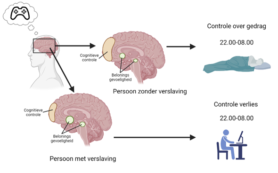Puberty
Concerns about gaming addiction among adolescents necessary?
By Nine Gerrits, April 11 2022

Photo by Vic_B via Pixabay
The online platform Kennisdomein reveals that 58% of adolescents between ages 10 and 20 have increased their gaming during the corona pandemic. Parents are concerned about this behavior and are afraid that their adolescent will become addicted. They often think back to their own childhoods ‘I used to play outside, why is it impossible to get my child off the screen.’ This concern is totally understandable, often parents have not gamed as much as their children. But is this concern really necessary?
University professor and neurobiologist Heidi Lesscher conducts research on addiction and the risk of developing an addiction. Lesscher says that compared to adults, adolescents are more sensitive to seeking rewards, both in the real and digital world. ‘However this does not necessarily mean that adolescents are susceptible to becoming addicted.’ Lesscher also says that susceptibility to developing an addiction is often a combination of several risk factors.
Stressful events as risk factor
Over the past few years, several factors have been found that increase the risk of developing a gaming addiction. A study conducted at Anyang Normal University in China found a link between game addiction and growing up a family where there is a lot of conflict. These can be parent-parent or parent-child conflicts. Not only this home situation is important, stressful events in general appear to play a role in problematic gaming behavior.
In early 2022, researcher Hao Li and his colleagues at Yangte University showed that there is a link between game addiction and stressful life events. These can be events such as illness, family problems, loss of loved ones and school pressure. They let 900 Chinese adolescents, aged 14.5 years on average, fill out several questionnaires about problematic gaming and stressful life events. The researchers showed that adolescents with high scores on stressful life events also had high scores on problematic gaming behavior. ‘It is important to remain alert to the behavior of adolescents after stressful situations,’ Lesscher said. ‘Adolescents experienced a different development during the corona pandemic. Now they also experience negativity from a war.’
When is gaming behavior problematic?
The Trimbos Institute, an independent knowledge institute for mental health and substance use, reveals that 4% of young people in 2019 were problematic gamers. To be categorized as a problematic gamer, a person must experience mild problems due to gaming and give a positive answer to at least five of the nine gaming disorder questions. Problematic gamers spend an average of 23 hours per week gaming, this is as much as nine hours more than hobby gamers. But if people are problematic gamers it does not necessarily mean they are addicted. According to the International Classification of Diseases, you are addicted if you cannot stop gaming despite serious negative consequences. Addicts continue to give gaming priority over other activities. This can worsen their school performance, cause sleep and eating problems and lead to social isolation.
It is often difficult to understand why people continue to perform these behaviors despite there being so many negative consequences. This is because gaming in some people causes the dopamine system in the brain to be activated. This system causes people to be reward- sensitive. Rewards can be everyday things like food, drinks and sex. Evolutionarily, it works tremendously well. You are rewarded for the behavior which makes for a greater chance of survival. It’s just that the reward system doesn’t always see the difference between addictive behaviors like gaming and everyday rewards like eating a nice dish or cuddling your partner. So why can certain behaviors turn into an addiction in one person and not another? Lesscher indicates that people with addiction have a decreased activity in a brain region important in the cognitive control of behavior. Reduced activity can make a person less able to choose the sensible option.

Loss of control in addiction: People with gaming addiction have a greater reward sensitivity to gaming and lower cognitive control. As a result, they are less able to choose the sensible option and continue to perform the behavior despite negative consequences. Photo created on Biorender.com
Loss of control in adolescence
This decreased control also takes place in the adolescent brain. During puberty, the brain goes through a new stage of development. This developmental process does not happen at the same time for every brain area. First, the reward system develops, causing adolescents to seek more thrills and show increased impulsivity. Scientist
Laurence Steinberg and colleagues showed back in 2008 that sensation seeking is at its strongest between the ages of 12 and 13. The brain regions important in cognitive control develop later. Having high impulsivity along with low cognitive control causes young people to take more risks.
This may sound scary but Lesscher says it is an indispensable development that takes place during adolescence. ‘Young people need to be encouraged to go out and find their own way. It is evolutionarily important for them to leave the nest.’ Puberty is a risk- taking phase but this does not always lead to problematic behavior.
Gaming in the fight against loneliness
Gaming is fortunately not always problematic and positive effects have also been found. Scientist Regan Mandryk and colleagues showed that gaming can combat loneliness. Additionally, adolescents can better regulate their emotions and their self-confidence rises. Gaming isn’t always an anti-social activity, either. Young people can get together with friends while gaming or even make new friends online. They get to know people all over the world with the click of a button.

Photo by StartupStockPhotos via Pixabay.
So is the growing concern necessary? Fortunately, not for every gaming adolescent. However, it is important that we remain alert to our children and make agreements together about their gaming time. Lesscher: “Start the conversation with your child. Let them know that you have a responsibility for them, make them aware of the risks of too much gaming and indicate that they need to get enough sleep so they are fresh and ready for school the next day.
Sources
https://www.kennisdomein.nl/maatschappelijk/de-groei-van-de-gaming-industrie/
https://icd.who.int/browse11/l-m/en#/http://id.who.int/icd/entity/1448597234
https://www.gameninfo.nl/cijfers/cijfers-over-gamen
Glicksohn, J., Naor-Ziv, R., & Leshem, R. (2018). Sensation seeking and risk-taking. In Developmental pathways to disruptive, impulse-control and conduct disorders (pp. 183-208). Academic Press.
Li, H., Gan, X., Li, X., Zhou, T., Jin, X., & Zhu, C. (2022). Diathesis stress or differential susceptibility? testing the relationship between stressful life events, neuroticism, and internet gaming disorder among Chinese adolescents. PloS one, 17(1), e0263079.
Mandryk, R. L., Frommel, J., Armstrong, A., & Johnson, D. (2020). How passion for playing World of Warcraft predicts in-game social capital, loneliness, and wellbeing. Frontiers in Psychology, 2165
Sublette, V. A., & Mullan, B. (2012). Consequences of play: A systematic review of the effects of online gaming. International journal of mental health and addiction, 10(1), 3-23.
Steinberg, L., Albert, D., Cauffman, E., Banich, M., Graham, S., & Woolard, J. (2008). Age differences in sensation seeking and impulsivity as indexed by behavior and self-report: evidence for a dual systems model. Developmental psychology, 44(6), 1764.
Wang, Y. (2021). The Impact of Interparental Conflicts on Online Game Addiction Symptomatology: The Mediating Roles of the Parent-Adolescent Relationship and Loneliness in Adolescents. Psychological Reports, 00332941211016751.
Interview conducted with neurobiologist and associate professor Heidi Lesscher (2/3/2022)

